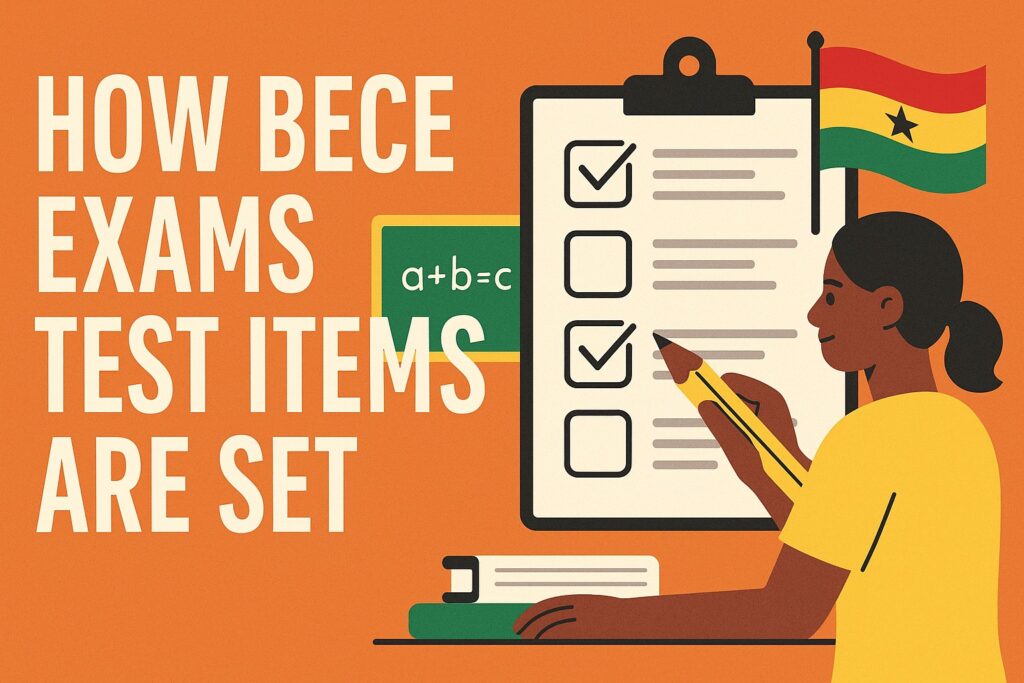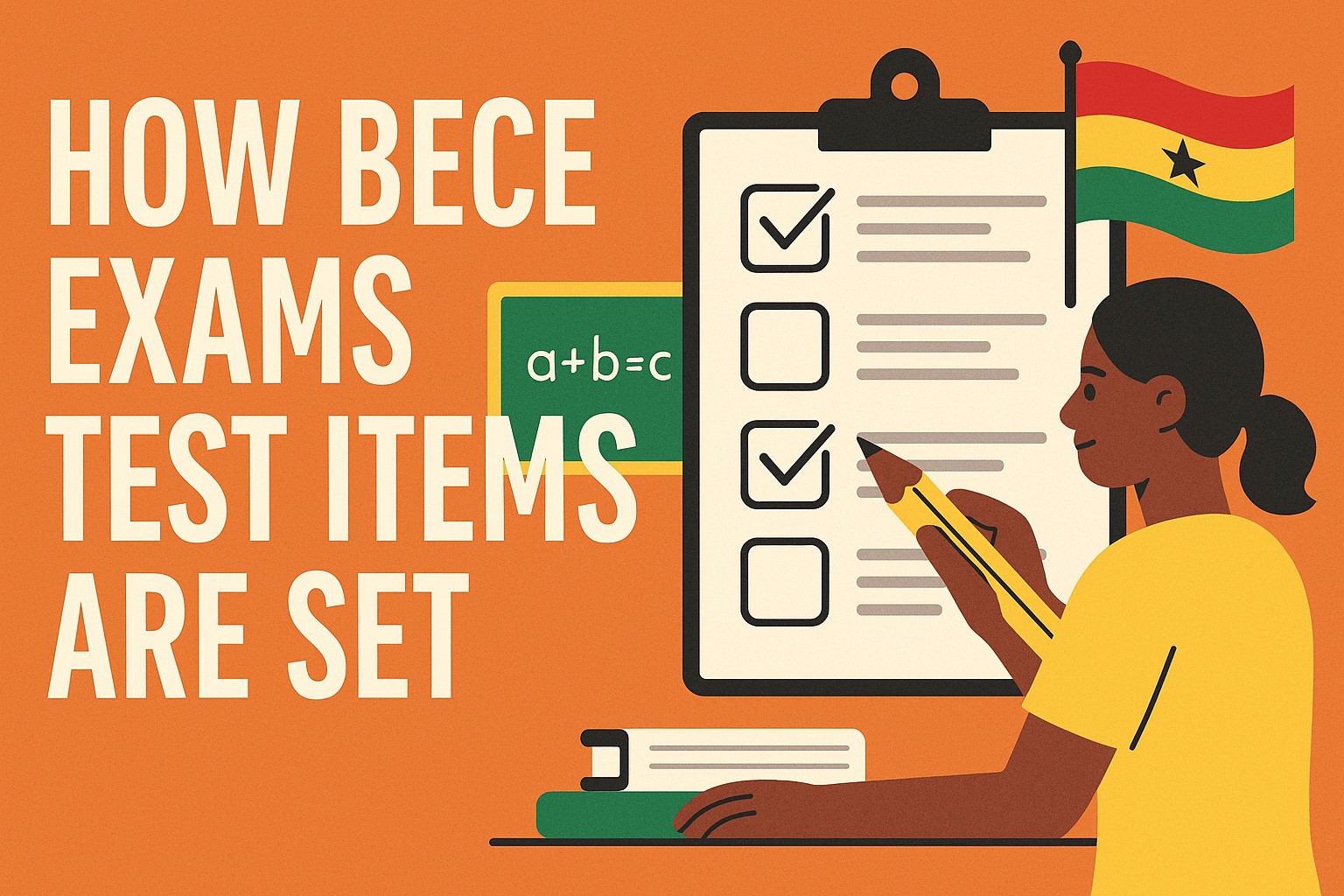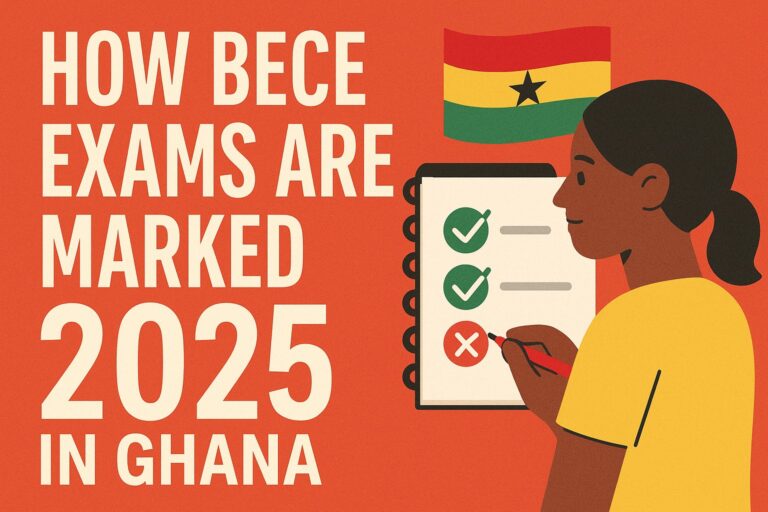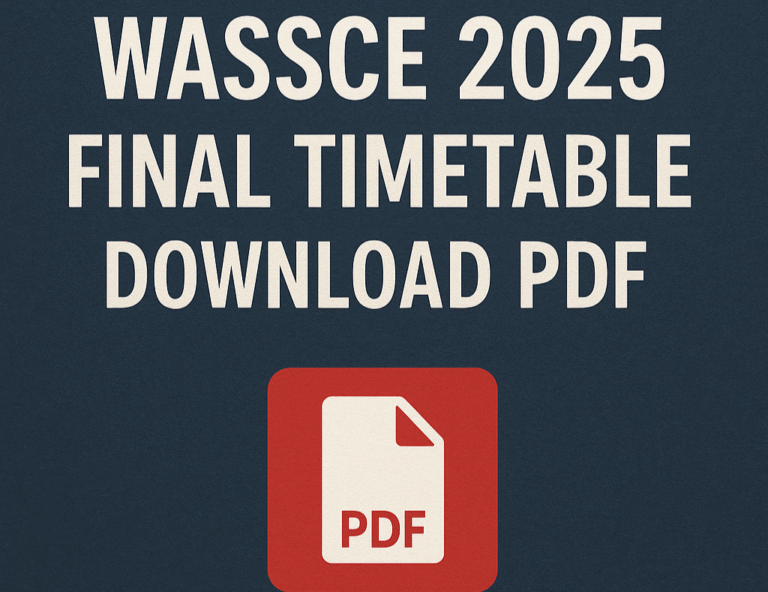Introduction
As a student preparing for the Basic Education Certificate Examination (BECE), you may have wondered at some point: How are BECE questions really set? Trust me, you’re not alone. When I was preparing for my exams, I often imagined a secret room full of teachers picking random questions! But over time, I learned there’s a lot more to it.
In this article, I’ll walk you through the real process behind how BECE questions are set — straight from WAEC itself. If you’re serious about passing BECE, understanding this process will give you a huge advantage.
Who Sets BECE Questions?
First things first — BECE questions are not set by just anyone. WAEC (West African Examinations Council) appoints Chief Examiners from across Ghana to create the questions. These Chief Examiners are usually experienced classroom teachers and respected educationists who know the syllabus inside and out.
Every year, WAEC tasks these experts to come up with several sets of questions for the subjects they specialize in. Knowing that real classroom teachers are involved should give you some comfort — the questions are based on what is taught in schools, not from some mysterious “outside source.”
How the Questions Are Created?
Here’s where it gets even more interesting. The Chief Examiners don’t just write random questions off the top of their heads. They carefully create questions that align with the national curriculum, focusing on important topics, national educational goals, and student performance history.
Each Chief Examiner submits a bank of possible questions to WAEC. From there, the real selection process begins. I found it fascinating that WAEC can have multiple complete sets of questions for each subject before finally settling on the one they’ll print!
RELATED ARTICLES YOU MIGHT ALSO BE INTERESTED IN
- How To Become WAEC Examiner To Mark or Examine WASSCE and or BECE
- How WASSCE Questions Are Set? The Whole Process Breakdown
Vetting and Selection at WAEC Headquarters
After the questions are submitted, they are sent to WAEC headquarters in Accra for rigorous vetting. Teams of subject heads carefully review every single question.
They check for:
- Alignment with national values and learning objectives.
- Focus on topics students struggle with (based on yearly Chief Examiners’ reports).
- Correctness, clarity, and relevance of each question.
- The introduction of new methods or concepts students need to master.
For example, if over the years students have avoided solving simultaneous equations using the graphical method, WAEC may set a question that forces candidates to use it!

Examples of Special Focus Areas
Let me give you a real-world example.
In solving simultaneous equations, there are three main methods: substitution, elimination, and graphical. If students seem to avoid the graphical method, WAEC might deliberately set a question asking you to only use the graphical method. This way, students can’t skip important skills!
Also, when a new topic or reform is introduced into the curriculum, WAEC makes sure to test candidates’ understanding to ensure schools are actually teaching it.
This is why following the updated syllabus is so crucial if you want to excel in BECE.
Backup Questions and Security Measures
Now, you may wonder: What if the exam questions leak?
Good question. WAEC is always one step ahead. For every subject, they prepare backup sets of questions — just in case the original set gets compromised.
After choosing the final questions, they lock everything down with serious security protocols. Only a small, trusted team knows what the final papers look like. From softcopy preparation to actual printing, it’s guarded heavily to prevent leakages and malpractices.
As a candidate, this should motivate you to prepare genuinely — there’s no shortcut!
Final Preparation Before Examination
When the final papers are printed, they are stored under tight security until the day of the exam.
WAEC ensures that everything remains confidential from start to finish.
Knowing all these efforts that go into setting your paper should push you to also give your best.
Why Understanding the Question-Setting Process Matters
You might be thinking: Okay, cool story. But why should I care?
Here’s why:
- Understanding this process shows that BECE is fair and syllabus-based.
- It reminds you to master all topics, even those you find difficult.
- It teaches you to pay attention to Chief Examiners’ reports, because WAEC uses them to design future questions.
- It encourages you to stay updated with any curriculum changes.
Knowing this gives you an advantage over students who only “study hard” without studying smart.
Printing and Security of BECE Questions
Once the final set of questions is selected, they are sent for printing under heavy security. WAEC takes exam security very seriously to prevent leakages and exam malpractice. Only a few trusted individuals have access to the printed papers, and even the soft copies are kept under tight control.
I used to think questions were set just a few days before exams — but now I know it’s a year-round process, full of strict security and planning!
Why Understanding This Process Matters for BECE Candidates
When you understand how the BECE questions are set, you can better prepare yourself:
- You’ll focus more on mastering the syllabus rather than chasing “apor” (leaked questions).
- You’ll practice new methods even if they seem hard.
- You’ll take Chief Examiners’ Reports seriously, knowing that WAEC uses them to select question areas.
So next time you’re studying, remember: you’re not just memorizing facts — you’re preparing to face a carefully designed test made by teachers who know exactly what you should know!
Frequently Asked Questions (FAQs)
1. Are BECE questions reused from past years?
From what I know, WAEC usually creates new questions every year. However, they sometimes base new questions on similar topics or skills tested in previous years — with a different twist. That’s why practicing past questions is still super helpful!
2. Can BECE questions leak before the exam?
WAEC puts very strong security measures in place to prevent leakages. While rare cases have happened in the past, the system is now much tighter. It’s always safer to prepare properly rather than hoping for “apor.”
3. Do Chief Examiners know which questions will be picked?
Not exactly. They submit a pool of questions, but the final selection is done by a team at WAEC headquarters. Even Chief Examiners might not know which ones will eventually be printed.
4. How important are Chief Examiners’ Reports for BECE candidates?
Extremely important! These reports highlight students’ common mistakes and areas where candidates usually perform poorly — and WAEC often tests these weak areas in future exams.
Ready to Master the BECE? Here’s What You Should Do Next!
Now that you know the secret behind how BECE questions are set, it’s time to take your preparation to the next level!
Here’s what I suggest:
- Study the full syllabus carefully.
- Practice past questions, but think deeper about the concepts.
- Download Chief Examiners’ Reports and learn from them.
- Master different methods of solving questions — don’t rely on just one technique.
- Stay focused and avoid chasing leaked papers.
If you want me to share free study plans, quizzes, and more BECE preparation tips, just subscribe to my newsletter or join our BECE WhatsApp group. Let’s crush BECE together!
Conclusion
So, the next time you sit in your classroom or at home solving past questions, just remember:
WAEC didn’t randomly throw those questions together. A lot of thought, planning, and security went into it — all to give you a fair chance to shine.
Prepare well, trust the process, and give it your all!
Success at BECE isn’t just for the smartest — it’s for the most prepared.







One Comment
Comments are closed.